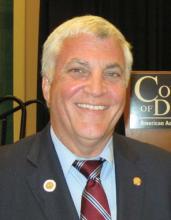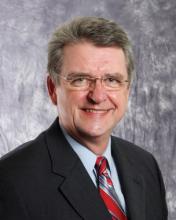User login
ORLANDO – If nothing changes between now and Jan. 1, Medicare payments will be cut by nearly 30%, causing a "catastrophic effect" on family physicians’ ability to run their practices, said Dr. Glen Stream, incoming president of the American Academy of Family Physicians.
While it’s nowhere near certain, the 12 members of the Joint Select Committee on Deficit Reduction – better known as the super committee – could be family medicine’s best shot at getting a quick and permanent fix to Medicare’s sustainable growth rate (SGR) formula.
"What has really turned things a bit different this time is the ‘Super 12’ deficit reduction process that’s in place," said Dr. Roland Goertz, outgoing AAFP president.
This is a unique opportunity because the super committee will have "huge protections" from the usual political wrangling in Washington, Dr. Goertz said during a Town Hall session at the AAFP Congress of Delegates.
For example, any proposed legislation has to remain amendment-free and cannot be filibustered in the Senate. In addition, their proposals are only subject to a simple up or down majority vote.
The challenge, though, is for the AAFP and its membership to get the super committee’s attention, said Dr. Stream.
The AAFP is calling on Congress to repeal the SGR and to provide at least a 3% increase in payments for primary care, said Dr. Stream, a family physician in Spokane, Wash. "Even repealing the SGR is a ‘Band-Aid’ fix on a flawed pay-for-service system. AAFP is looking at models that more properly pay for our services."
The six Democrat and six Republican lawmakers appointed to the super committee are charged with finding $1.5 trillion to cut from the U.S. federal budget by Thanksgiving. Their focus – the entire federal budget, not just health care – is part of the challenge for the AAFP.
"If you think about how many people are trying to contact those 12, it’s got to be immense," said Dr. Goertz, who is also a family physician in Waco, Texas.
"The [AAFP] Board approved what I think is an innovative way to try to reach some of the super 12 and others." The academy will produce videos featuring real family physicians who describe the real impact of these cuts for their practices, Dr. Goertz said. With a nod to the sometimes viral nature of electronic communication, he told town hall participants, "We’re going to ask that all of you send them to everybody you could potentially send them to."
In addition to these videos, the AAFP sent letters to each member of the super committee. Also, in each state these 12 lawmakers call home, the AAFP local chapter requested a meeting. "We have got to mobilize. Our advisors say the most effective thing is getting our member voices heard by the super committee as much as possible," Dr. Goertz said.
This doesn’t mean the AAFP does not have a back-up plan.
"At the same time we are working as hard as we can with the super 12, we are also anticipating that if they do not tackle this ... and the issue of SGR reverts to the routine committees of record in the House and Senate, that we are ready to influence them as best we can," Dr. Goertz said.
The AAFP wants and prefers a permanent fix to SGR, Dr. Goertz said. "If a permanent fix is not possible, we want long-term fix of 5 years and a 3% positive update for primary care services and primary care each year of that 5-year fix."
ORLANDO – If nothing changes between now and Jan. 1, Medicare payments will be cut by nearly 30%, causing a "catastrophic effect" on family physicians’ ability to run their practices, said Dr. Glen Stream, incoming president of the American Academy of Family Physicians.
While it’s nowhere near certain, the 12 members of the Joint Select Committee on Deficit Reduction – better known as the super committee – could be family medicine’s best shot at getting a quick and permanent fix to Medicare’s sustainable growth rate (SGR) formula.
"What has really turned things a bit different this time is the ‘Super 12’ deficit reduction process that’s in place," said Dr. Roland Goertz, outgoing AAFP president.
This is a unique opportunity because the super committee will have "huge protections" from the usual political wrangling in Washington, Dr. Goertz said during a Town Hall session at the AAFP Congress of Delegates.
For example, any proposed legislation has to remain amendment-free and cannot be filibustered in the Senate. In addition, their proposals are only subject to a simple up or down majority vote.
The challenge, though, is for the AAFP and its membership to get the super committee’s attention, said Dr. Stream.
The AAFP is calling on Congress to repeal the SGR and to provide at least a 3% increase in payments for primary care, said Dr. Stream, a family physician in Spokane, Wash. "Even repealing the SGR is a ‘Band-Aid’ fix on a flawed pay-for-service system. AAFP is looking at models that more properly pay for our services."
The six Democrat and six Republican lawmakers appointed to the super committee are charged with finding $1.5 trillion to cut from the U.S. federal budget by Thanksgiving. Their focus – the entire federal budget, not just health care – is part of the challenge for the AAFP.
"If you think about how many people are trying to contact those 12, it’s got to be immense," said Dr. Goertz, who is also a family physician in Waco, Texas.
"The [AAFP] Board approved what I think is an innovative way to try to reach some of the super 12 and others." The academy will produce videos featuring real family physicians who describe the real impact of these cuts for their practices, Dr. Goertz said. With a nod to the sometimes viral nature of electronic communication, he told town hall participants, "We’re going to ask that all of you send them to everybody you could potentially send them to."
In addition to these videos, the AAFP sent letters to each member of the super committee. Also, in each state these 12 lawmakers call home, the AAFP local chapter requested a meeting. "We have got to mobilize. Our advisors say the most effective thing is getting our member voices heard by the super committee as much as possible," Dr. Goertz said.
This doesn’t mean the AAFP does not have a back-up plan.
"At the same time we are working as hard as we can with the super 12, we are also anticipating that if they do not tackle this ... and the issue of SGR reverts to the routine committees of record in the House and Senate, that we are ready to influence them as best we can," Dr. Goertz said.
The AAFP wants and prefers a permanent fix to SGR, Dr. Goertz said. "If a permanent fix is not possible, we want long-term fix of 5 years and a 3% positive update for primary care services and primary care each year of that 5-year fix."
ORLANDO – If nothing changes between now and Jan. 1, Medicare payments will be cut by nearly 30%, causing a "catastrophic effect" on family physicians’ ability to run their practices, said Dr. Glen Stream, incoming president of the American Academy of Family Physicians.
While it’s nowhere near certain, the 12 members of the Joint Select Committee on Deficit Reduction – better known as the super committee – could be family medicine’s best shot at getting a quick and permanent fix to Medicare’s sustainable growth rate (SGR) formula.
"What has really turned things a bit different this time is the ‘Super 12’ deficit reduction process that’s in place," said Dr. Roland Goertz, outgoing AAFP president.
This is a unique opportunity because the super committee will have "huge protections" from the usual political wrangling in Washington, Dr. Goertz said during a Town Hall session at the AAFP Congress of Delegates.
For example, any proposed legislation has to remain amendment-free and cannot be filibustered in the Senate. In addition, their proposals are only subject to a simple up or down majority vote.
The challenge, though, is for the AAFP and its membership to get the super committee’s attention, said Dr. Stream.
The AAFP is calling on Congress to repeal the SGR and to provide at least a 3% increase in payments for primary care, said Dr. Stream, a family physician in Spokane, Wash. "Even repealing the SGR is a ‘Band-Aid’ fix on a flawed pay-for-service system. AAFP is looking at models that more properly pay for our services."
The six Democrat and six Republican lawmakers appointed to the super committee are charged with finding $1.5 trillion to cut from the U.S. federal budget by Thanksgiving. Their focus – the entire federal budget, not just health care – is part of the challenge for the AAFP.
"If you think about how many people are trying to contact those 12, it’s got to be immense," said Dr. Goertz, who is also a family physician in Waco, Texas.
"The [AAFP] Board approved what I think is an innovative way to try to reach some of the super 12 and others." The academy will produce videos featuring real family physicians who describe the real impact of these cuts for their practices, Dr. Goertz said. With a nod to the sometimes viral nature of electronic communication, he told town hall participants, "We’re going to ask that all of you send them to everybody you could potentially send them to."
In addition to these videos, the AAFP sent letters to each member of the super committee. Also, in each state these 12 lawmakers call home, the AAFP local chapter requested a meeting. "We have got to mobilize. Our advisors say the most effective thing is getting our member voices heard by the super committee as much as possible," Dr. Goertz said.
This doesn’t mean the AAFP does not have a back-up plan.
"At the same time we are working as hard as we can with the super 12, we are also anticipating that if they do not tackle this ... and the issue of SGR reverts to the routine committees of record in the House and Senate, that we are ready to influence them as best we can," Dr. Goertz said.
The AAFP wants and prefers a permanent fix to SGR, Dr. Goertz said. "If a permanent fix is not possible, we want long-term fix of 5 years and a 3% positive update for primary care services and primary care each year of that 5-year fix."
EXPERT ANALYSIS AT THE AMERICAN ACADEMY OF FAMILY PHYSICIANS CONGRESS OF DELEGATES

